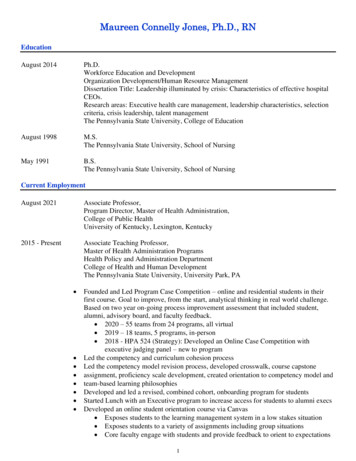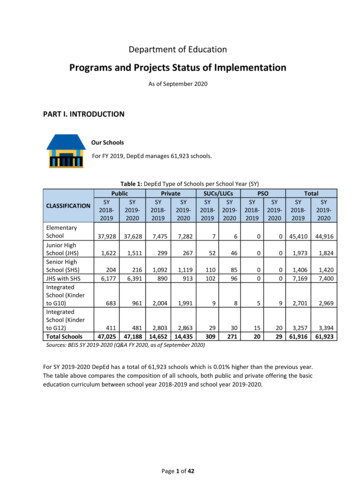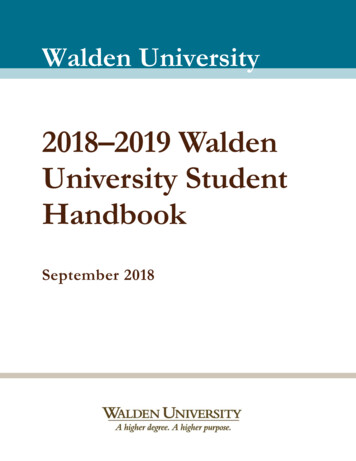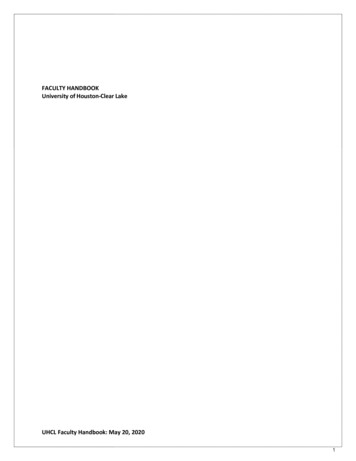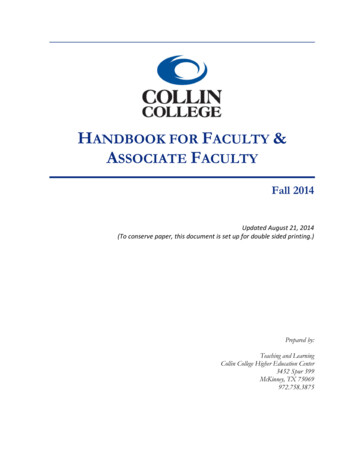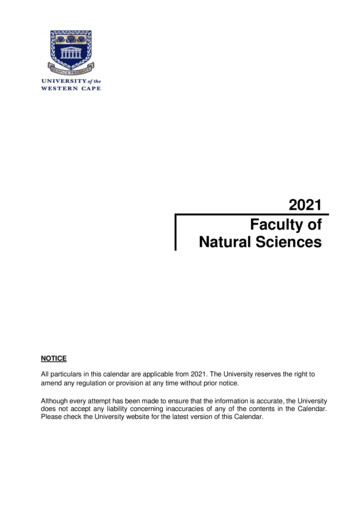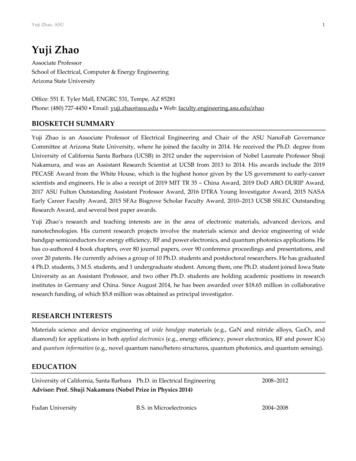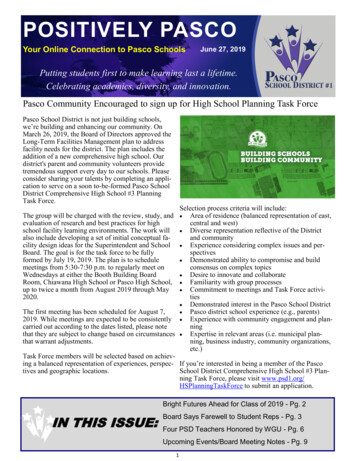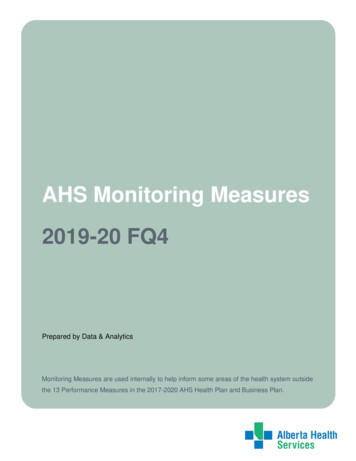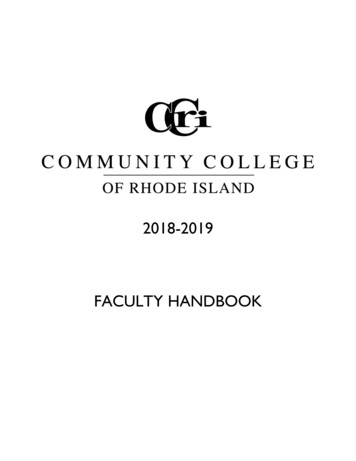
Transcription
2018-2019FACULTY HANDBOOK
Table of ContentsTable of Contents . 2I.Introduction . 4A. Welcome to New Faculty . 4B. Mission Statement . 4C. Code of Ethics . 4II.Governance and Organization . 5A. Rhode Island Office of the Postsecondary Commissioner . 5B. Rhode Island Board of Education . 5C. Accreditation. 6III.College Catalog . 6IV.CCRI Strategic Plan. 6A. CCRI’s 2018-2021 Strategic Plan. 61. Goal One – Enhance Student Success and Completion . 62. Goal Two – Expand Partnerships and Programs . 73. Goal Three – Strengthening Institutional Effectiveness . 8B. Key Performance Indicators . 91. Goal One – Enhance Student Success and Completion . 92. Goal Two – Expand Partnerships and Programs . 93. Goal Three – Strengthening . 9V.Academic Vision . 9A. Academic Freedom . 9B. Academic Honesty . 10C. Academic Philosophy. 12VI.Faculty Contracts . 12A. Full-Time Faculty Contract . 12B. Part-Time Faculty Association Agreement. 12VII.A.B.C.D.E.Academic Policies and Procedures . 12Classroom Assignments . 12Classroom Policy. 13Responsible Use of Technology . 13Copyrights and Intellectual Property . 18Grading Policies . 191. Grading System . 192
2. When to Assign an Incomplete Grade . 193. Course Withdrawals . 204. Cumulative Grade Index. 215. Grade Reports . 216. Dean’s List . 227. Graduation Awards . 228. In-House Credits . 22F. Academic Standards . 221. The Goal of the Policy . 222. Academic Standards. 233. Categories of Academic Standings . 234. Appeal Process. 245. Academic Renewal/Forgiveness Policy . 24G. Academic Progress . 26H. Honors Program . 28I. FERPA Policy . 30VIII.A.B.C.D.E.F.G.Teaching Resources . 30Syllabus Components and Design . 30Seven Principles for Good Practice in Undergraduate Education. 30The First Day of Class: Advice and Ideas . 32Instructor’s Protocol for Classroom Management . 34Library Instruction . 34CITLA (Center for Innovative Teaching and Learning) . 35Conferences . 36IX.Instructional Technology Resources . 36Center for Instruction & Technology . 36Online Learning . 36Classroom and Event Technology . 37Electronic Classrooms . 37E-Mail . 38Faculty Web Pages . 38Help Desk . 38Interactive Video Conferencing . 38MyCCRI Login and Documentation. 39New Employee Orientation to Information Technology . 40Request for Services: Video Production . 40Teaching Tools. 40Technology Training . 41Technology in the Classroom . 41A.B.C.D.E.F.G.H.I.J.K.L.M.N.3
I.INTRODUCTIONA. Welcome to New FacultyWelcome to CCRI! We are delighted that you have joined our faculty. By now you should havemet with your department chairperson. He/she will be your main source of information aboutyour responsibilities, syllabi, resources, departmental policies, and professional evaluation. Wehope that you will be able to attend general faculty meetings, departmental activities, and facultydevelopment workshops.The College Catalog, the College website (ccri.edu), and the Student Handbook are valuablesources of information.B. Mission StatementThe Community College of Rhode Island is the state’s only public comprehensive associatedegree-granting institution. We provide affordable open access to higher education atlocations throughout the state. Our primary mission is to offer recent high school graduatesand returning adults the opportunity to acquire the knowledge and skills necessary forintellectual, professional and personal growth through an array of academic, career andlifelong learning programs. We meet the wide-ranging educational needs of our diversestudent population, building on our rich tradition of excellence in teaching and our dedicationto all students with the ability and motivation to succeed. We set high academic standardsnecessary for transfer and career success, champion diversity, respond to community needs,and contribute to our state’s economic development and the region’s workforce.C. Code of EthicsThe Community College of Rhode Island is an institution whose paramount mission is theenhancement of growth and learning in every one of its members--students, staff, faculty,administrators, and members of the Board of Education. Membership in this institution involvesboth privileges and obligations. To preserve the balance between these, and to ensurecongruence between all college activities and the college mission, the College has formulated aCode of Ethics by which institutional and individual decisions shall be measured. Broadlyinterpreted, this code expresses a commitment of conscience, that is, we pledge to conduct ouraffairs, in spirit as well as in letter, with honesty, frankness, and integrity. The following areessential to this commitment:1. The terms of this Code of Ethics are to be taken by each member of the CCRI communityas a guide in all dealings pertinent to this institution.2. The principle of academic freedom shall in no way be dishonored.4
3. The resolution of conflicts shall be guided by traditionally held, fundamental, andcommonly understood principles of honesty, mutual respect, justice, fair play, and equity.4. The allocation of institutional resources shall be governed by this Code of Ethics, aspermitted by the availability of these resources.5. The ethical obligations incurred by faculty and staff because of membership in professionalorganizations external to this institution should be upheld by those individuals. Thisstatement should not be construed to conflict with other such codes of ethics. In no casewould it be considered appropriate for anyone to treat professional standards glibly orirresponsibly.6.II.College employees are also governed by Rhode Island General Laws. Visit the EthicsCommission website at http://www.ethics.ri.gov . (Ref: State Code of Ethics, R.I. Gen.Laws 36-14-1 et. seq. )GOVERNANCE AND ORGANIZATIONA. Rhode Island Office of the Postsecondary CommissionerThe mission of the Office of the Postsecondary Commissioner (OPC) is to support the work ofthe Board of Education and the Council on Postsecondary Education in providing an excellent,accessible and affordable system of higher education designed to improve the overall educationalattainment of the citizens of Rhode Island, support economic development, and enrich the civic,social and cultural life of all living in the state of Rhode Island.The Office serves as the definitive resource for information on and the interpretation of Councilpolicy for public higher education and the postsecondary institutions in Rhode Island that areunder the authority of the Council on Postsecondary Education (the University of Rhode Island,Rhode Island College, and the Community College of Rhode Island). The Office looks for sharedopportunities to advance the objectives of postsecondary education with the public andindependent institutions.B. Rhode Island Board of EducationThe Community College of Rhode Island and the two other public institutions for highereducation in Rhode Island (Rhode Island College and the University of Rhode Island) are governedby the Rhode Island Board of Education. The Rhode Island Board of Education was created bythe Rhode Island General Assembly in 2014 and replaced the Board of Regents for Elementaryand Secondary Education and the Board of Governors for Higher Education. This consolidatedgovernance of all public education in Rhode Island is an innovative integration of policymakingand planning for elementary, secondary and higher public education in our state. The Boardconsists of 17 members. The chair, who is one of the 17 members, serves at the pleasure of theGovernor.5
C. AccreditationQUICK LINKS From the college catalog - PDF* NECHE Standards NECHE Accreditation Update Specialized Accreditations include:o Accreditation Commission for Education in Nursing (ACEN)o Accreditation Council for Business Schools and Programs (ACBSP)o Accreditation Council for Occupational Therapy Association (ACOTE)o Commission on Massage Therapy Accreditation (COMTA)o Commission on Dental Accreditation for Dental Auxiliary Programs of AmericanDental Associationo Commission on Accreditation of Health Education Programs (CAAHEP)o Commission on Accreditation of Physical Therapy Education (CAPTE)o Joint Review Committee on Education in Radiologic Technology (JRCERT)o National Accreditation Agency for Clinical Laboratory Science (NAACLS)o Commission on Accreditation for Respiratory Care ( JAART)o Joint Review Committee on Education Diagnostic Medical Sonographyo New England Heart Associationo National Association of Activity Professionals (NAAP/NCCAP)o National Association of Schools of Music (NASM)o National Association for the Education of Young Children (NAEYC)III.COLLEGE CATALOGClick here to view CCRI’s 2018-2019 College CatalogIV.CCRI STRATEGIC PLAN 2018-2021A. CCRI 2018-2021 Strategic Plan1. GOAL ONE - Enhance Student Success and CompletionWe will work diligently to ensure student success with the objective of increasing certificate anddegree completion rates, based on our belief that our students are motivated, capable andcommitted to attaining academic achievement. With equity as a cornerstone, our role is to ensureexcellence in academic quality and support services to prepare students for success throughcompletion, transfer or placement in the workforce.STRATEGIESA. Support college readiness by scaling high-impact best practices6
a. Maximize college readiness by expanding engagement with high school students andadult education students.b. Deliver a holistic, student-centered system of onboarding, orientation and ongoingadvising.c. Continue to define and broaden efforts to improve and accelerate pathways throughdevelopmental education.d. Assess college readiness in various ways through the use of multiple measures andPrior Learning Assessment (PLA).B. Provide pathways that enhance structure and supporta. Implement guided pathways, including the establishment of meta majors.b. Create pathways that include multiple on and off ramps.c. Establish course schedules and course offerings that align with student demand andsupport the guided pathways structure.d. Establish seamless transfer pathways for our top five transfer majors to Rhode IslandCollege and University of Rhode Island.C. Enhance teaching and learninga. Standardize the process of curriculum design and review to ensure quality, rigor andcontinuous curricular improvement.b. Enhance the process for assessing student learning.c. Develop a technology-based system to capture and analyze assessment data to informcontinuous improvement of teaching practices.d. Implement faculty professional development program that focuses on best practicesrelated to student engagement and active learning.2. GOAL TWO - Expand Partnerships and ProgramsTo prepare our students for future success and to support Rhode Island’s economic andworkforce goals, we will continue to develop robust partnerships and programs that align witheducational institutions, employer needs and community organizations. With equity as our frame,these partnerships will provide our students with the outstanding education, skills training andsupport they require to successfully transfer to a four-year institution or secure qualityemployment. Our emphasis on partnerships and programs will allow us to promote our collegeas an adaptive, responsive, high-performing institution.STRATEGIESA. Develop a process to better understand and respond to the economic needs of Rhode Islandas well as the needs and goals of our students.a. Develop a systematic approach to understanding students’ academic interests, careergoals and other non-academic needs.b. Enhance institutional capacity to collect, analyze and use labor market data to forecastworkforce needs.c. Build capacity to review and analyze curriculum that reflects labor market informationand information about our students’ needs and goals.7
B. Leverage the resources of our college and educational, workforce and economic developmentpartners to meet the needs of our students and the state of Rhode Island.a. Provide students with skills to secure employment now and continue their educationand growth into family-sustaining careers.b. Develop our programs in collaboration with industry and business leaders to ensurethey meet current and future workforce needs.c. Build academic, employer and community partnerships with organizations that shareour vision and strengthen our capacity across our college.d. Design opportunities for more flexible programming and alternative credentials tomeet student and employer needs. v. Expand community partnerships to meetstudents’ non-academic needs.3. GOAL THREE - Strengthening Institutional EffectivenessWe will improve institutional effectiveness by developing a strong organizational culture, investingin professional development and enhancing our systems. We will collectively embrace a cultureof trust, respect and open, transparent communication. We will invest in ongoing professionaldevelopment that positions faculty and staff to continuously grow and develop in their careers.We will revitalize our financial, operational and technology systems to enable our college to bemore innovative, effective and responsive. Through this focus on institutional effectiveness, wewill support more collaborative, data-driven, student-centered decision-making.STRATEGIESA. Foster a culture that promotes transparency, collaboration, respect, and accountability.a. Clarify and strengthen internal processes to ensure timely, clear communicationamong faculty, administration, staff and students.b. Build an ongoing college-wide program devoted to enhancing collaboration andrespect.c. From the institutional to the individual level, identify goals that are clear, measurableand advance the mission of our college.B. Promote a rich environment of professional development that rewards performance andencourages all faculty and staff to develop and expand their skills.a. Build a robust onboarding process for new employees that focuses on college culture,essential skills and ongoing professional development opportunities.b. Implement a comprehensive professional development program that includesinstitutional and individual plans that contribute to improving the overall performanceof our college.C. Create data-driven systems to support our college’s mission and promote continuousimprovement.a. Develop a system for regularly reviewing technology and organizational operations toimprove institutional efficiency and effectiveness.b. Utilize predictive analytics to assist in understanding our student population, theirgoals and potential challenges.8
c. Utilize technology for communicating organizational and individual key performanceindicators.d. Develop an annual budget process and resource allocation plan that aligns withstrategic goals.B. Key Performance Indicators1. GOAL ONE – Enhance Student Success and CompletionIncreasing percentages of: first-time, full-time students graduating in two years. first-time, full-time students graduating in three years. first-time, full-time students earning 12 credits in first year, including prior and followingsummers. all CCRI transfer-out students who earned a degree before transfer. entering first-time cohort completing Math 1200 or 1430 in first year, including both summers(“C” or better). entering first-time cohort completing English 1010 in first year, including both summers (“C”or better).2. GOAL TWO – Expand partnerships and programs Increasing the number of certificates in high-demand, high-wage career fields as percentageof total certificates awarded.Degrees in high-demand, high-wage career fields as percentage of degrees awarded.3. GOAL THREE – Strengthening Institutional Effectiveness Increasing the number of employees reporting increased job satisfaction and engagement viaemployee survey. Employees participating in educational opportunities, such as employee/manager developmentprograms, professional development opportunities and tuition waiver programs for continuededucation.V.ACADEMIC VISIONA. Academic Freedom html)The current contract CCRIFA Faculty Union Contract (2015 – 2018) contains the followingstatement pertaining to Academic Freedom:"'Academic Freedom' is essential to the college and its faculty and applies to both teaching andresearch. Freedom in research is fundamental to the advancement of truth. Academic Freedomin its teaching aspects is fundamental to the protection of the rights of the teacher in teachingand to the students for freedom of learning. It carries with it duties correlative with rights. The9
teacher is entitled to freedom in the classroom in discussing his subject." (ARTICLE III RIGHTSOF INDIVIDUALS)In summary, the concept of "Academic Freedom" is complex. It embodies the right to pursuenew knowledge through research and publications, and the freedom in the classroom to discussthose topics in which faculty are professionally qualified as determined by their credentials.The exercise of "Academic Freedom" carries with it the correlate responsibilities for presentinginformation accurately, restricting the controversial information to the subject matter underdiscussion, and exercising sound judgment in guarding against distortions and inaccuracies.Another valuable resource to learn more about the rights and responsibilities is the AmericanAssociation of University Professors.Visit the organization's website at http://www.aaup.org/aaupB. Academic Honesty html)IntroductionFrom its inception, the American Association of University Professors has recognized thatmembership in the academic profession carries with it special responsibilities. The Associationhas consistently affirmed these responsibilities in major policy statements, providing guidance toprofessors in such matters as their utterances as citizens, the exercise of their responsibilities tostudents and colleagues, and their conduct when resigning from an institution or whenundertaking sponsored research. The Statement on Professional Ethics that follows sets forththose general standards that serve as a reminder of the variety of responsibilities assumed by allmembers of the profession.In the enforcement of ethical standards, the academic profession differs from those of law andmedicine, whose associations act to ensure the integrity of members engaged in private practice.In the academic profession the individual institution of higher learning provides this assurance andso should normally handle questions concerning propriety of conduct within its own frameworkby reference to a faculty group. The Association supports such local action and stands ready,through the general secretary and the Committee on Professional Ethics, to counsel withmembers of the academic community concerning questions of professional ethics and to inquireinto complaints when local consideration is impossible or inappropriate. If the alleged offense isdeemed sufficiently serious to raise the possibility of adverse action, the procedures should be inaccordance with the 1940 Statement of Principles on Academic Freedom and Tenure , the1958 Statement on Procedural Standards in Faculty Dismissal Proceedings , or the applicableprovisions of the Association’s Recommended Institutional Regulations on Academic Freedomand Tenure .10
The Statement1. Professors, guided by a deep conviction of the worth and dignity of the advancement ofknowledge, recognize the special responsibilities placed upon them. Their primary responsibilityto their subject is to seek and to state the truth as they see it. To this end professors devotetheir energies to developing and improving their scholarly competence. They accept theobligation to exercise critical self-discipline and judgment in using, extending, and transmittingknowledge. They practice intellectual honesty. Although professors may follow subsidiaryinterests, these interests must never seriously hamper or compromise their freedom of inquiry.2. As teachers, professors encourage the free pursuit of learning in their students. They holdbefore them the best scholarly and ethical standards of their discipline. Professors demonstraterespect for students as individuals and adhere to their proper roles as intellectual guides andcounselors. Professors make every reasonable effort to foster honest academic conduct and toensure that their evaluations of students reflect each student’s true merit. They respect theconfidential nature of the relationship between professor and student. They avoid anyexploitation, harassment, or discriminatory treatment of students. They acknowledge significantacademic or scholarly assistance from them. They protect their academic freedom.3. As colleagues, professors have obligations that derive from common membership in thecommunity of scholars. Professors do not discriminate against or harass colleagues. They respectand defend the free inquiry of associates. In the exchange of criticism and ideas professors showdue respect for the opinions of others. Professors acknowledge academic debt and strive to beobjective in their professional judgment of colleagues. Professors accept their share of facultyresponsibilities for the governance of their institution.4. As members of an academic institution, professors seek above all to be effective teachers andscholars. Although professors observe the stated regulations of the institution, provided theregulations do not contravene academic freedom, they maintain their right to criticize and seekrevision. Professors give due regard to their paramount responsibilities within their institution indetermining the amount and character of work done outside it. When considering theinterruption or termination of their service, professors recognize the effect of their decision uponthe program of the institution and give due notice of their intentions.5. As members of their community, professors have the rights and obligations of other citizens.Professors measure the urgency of these obligations in the light of their responsibilities to theirsubject, to their students, to their profession, and to their institution. When they speak or act asprivate persons, they avoid creating the impression of speaking or acting for their college oruniversity. As citizens engaged in a profession that depends upon freedom for its health andintegrity, professors have a particular obligation to promote conditions of free inquiry and tofurther public understanding of academic freedom. (End of Statement on Professional Ethics)11
C. Academic Philosophy html)The phrase "Academic Philosophy" could refer to many different things. As it is used here, itrefers to CCRI's approach to working with students in a manner that is consistent with CCRI'smission and vision. Our mission commits us to a teaching/learning philosophy that embraces astrong belief and subsequent commitment to dedicating ourselves to providing learningenvironments that maximize and enhance all students' opportunities to learn. As an extensionof this philosophy, CCRI expects faculty to participate in ongoing asses
by the Rhode Island Board of Education. The Rhode Island Board of Education was created by the Rhode Island General Assembly in 2014 and replaced the Board of Regents for Elementary and Secondary Education and the Board of Governors for Higher Education. This consolidated governance of all public education in Rhode Island is an innovative integration of policymaking and planning for elementary, secondary and higher public education in our state.
